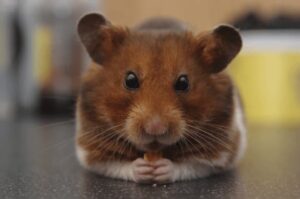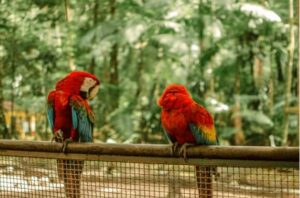Choosing the right pet bird as a beginner can be both exciting and overwhelming. With so many species available, it’s essential to find one that matches your lifestyle, experience level, and commitment. Birds vary in size, personality, and care needs, making some species more suitable for first-time owners than others. In this guide, we’ll explore the best pet birds for beginners, their characteristics, and what makes them ideal companions.
Factors to Consider Before Getting a Pet Bird
Before bringing home a pet bird, consider the following:
- Lifespan: Some birds can live for decades.
- Space Requirements: Ensure you have enough room for a cage and free flight time.
- Noise Level: Some birds are quieter than others.
- Social Needs: Some birds require constant interaction, while others are more independent.
- Diet & Health: Proper nutrition and vet care are essential for a bird’s well-being.
Best Pet Birds for Beginners
Here are some of the best pet birds for beginners, based on their ease of care, temperament, and social needs.
Parakeets (Budgies)

Parakeets, also known as budgies, top the list as the most popular pet birds in the United States. They are easy to care for and come in vibrant shades of blue, green, white, and yellow, often adorned with black speckles on their heads, backs, and wings. With proper care, budgies are affectionate, friendly, and can even be trained to perform tricks or mimic speech. They thrive on social interaction, so consider getting a companion (preferably another budgie) to keep them company. Budgies are also great for families with children. While they may give a tiny nip when annoyed, their bites are far less painful compared to larger birds.
Though they are content in a cage, parakeets need daily exercise. Allowing them to fly freely in a safe, enclosed space for an hour each day will help keep them healthy and active. Before letting them out, ensure they are trained and, if necessary, clip their wings for safety.
- Lifespan: 10 years
- Size: Small
- Noise Level: Low
- Social Needs: Moderate
Cockatiels

Cockatiels are another popular pet bird choice, even outselling budgies in some regions! These small, affectionate birds are typically gray, white, and yellow, with distinctive red cheek patches and feathered crests. They are intelligent, easy to train, and love social interaction, preferring to bond with multiple people rather than just one. Cockatiels are great family pets and interact well with children. However, they do require a bit more training and a larger cage than budgies.
Cockatiels should be let out of their cage daily for a few hours to exercise. Providing a safe, open space within your home will allow them to stretch their wings while feeling secure. Their affectionate and low-maintenance nature makes them an excellent choice for beginners.
- Lifespan: 20 years
- Size: Small
- Noise Level: Low
- Social Needs: Moderate
Parrotlets
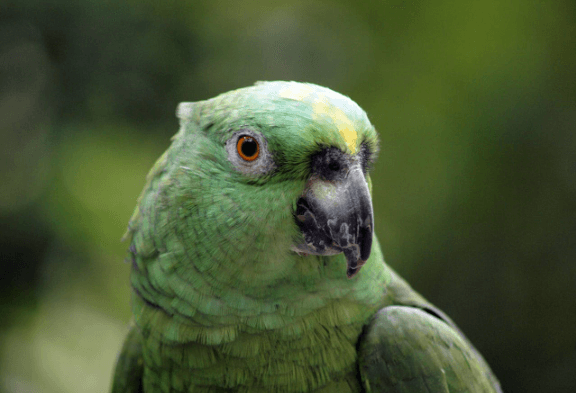
Parrotlets are tiny birds bursting with personality. These bold, curious, and energetic birds come in various colors, including blue, green, and yellow. While affectionate, they require consistent interaction to bond with their owners. Engaging with them through hand-feeding, trick training, and playtime is essential. Without enough mental stimulation, parrotlets can become destructive. If kept with a companion, they will bond strongly with their cage mate, often ignoring human interaction.
Like other birds, parrotlets need regular exercise. Allow them to fly freely in a secure room for a few hours each day, but only after ensuring they are well-trained.
- Lifespan: 20 years
- Size: Extra Small
- Noise Level: Medium
- Social Needs: Low (with a companion) / Moderate (if solo)
Lovebirds
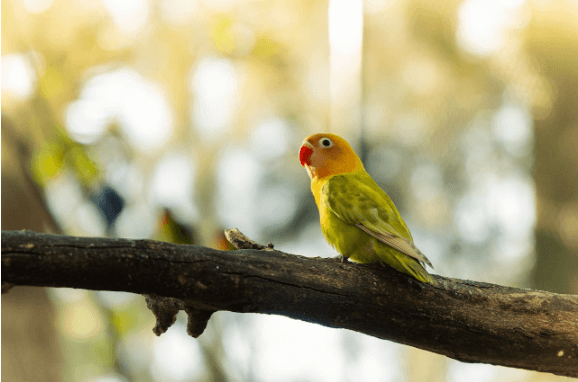
Lovebirds are vibrant, sociable, and full of energy. Their bright, rainbow-like colors make them visually stunning pets. These little birds are affectionate but can also be territorial, requiring consistent handling and training to prevent aggressive behavior. When raised properly, they become cuddly and develop strong bonds with their owners. Lovebirds enjoy playing with toys, especially ones designed for chewing. While they don’t necessarily need a mate, they do prefer the company of other birds.
To keep them happy and healthy, lovebirds require ample exercise. Letting them fly in a secure space for a few hours daily will help meet their physical activity needs.
- Lifespan: 20 years
- Size: Small
- Noise Level: Low
- Social Needs: Low (with a companion) / Moderate (if solo)
Amazon Parrots

Amazon parrots are lively, social, and intelligent birds known for their ability to talk and sing. Their expressive nature makes them easy to understand and care for, as they clearly communicate their wants and needs. However, they require a lot of attention and would not be suitable for someone with a busy schedule. Due to their size and social nature, Amazon parrots need a large cage and daily interaction.
These birds should be let out for a few hours each day to fly and socialize. If you’re looking for an affectionate and energetic pet, an Amazon parrot could be the perfect match!
- Lifespan: 30+ years
- Size: Medium
- Noise Level: Loud
- Social Needs: High
Doves

While doves enjoy spending time with their owners, they are not overly demanding when it comes to attention. This makes them an excellent choice for pet owners with busy lifestyles or those who cannot be home frequently. Known for their calm demeanor, doves are gentle and affectionate when handled or hand-fed, making them delightful companions.
Despite their independence, doves are still social creatures. If kept alone, they require regular interaction and the opportunity to fly freely to stay happy and healthy. They make wonderful pets for older children who understand the importance of gentle handling. Many owners appreciate their soothing cooing sounds, which add to their charm.
Unlike parrots, doves cannot climb cage bars; instead, they rely on flying from perch to perch. Because of this, they require a spacious cage to move around comfortably.
Species Information
- Weight: 5 to 8 ounces
- Length: 11 to 13 inches
- Physical Characteristics: Typically brown or dull gray with black eyes, a black beak, and a distinctive collar around the neck. Some variations include white, orange, and pied (as seen in ring-necked doves).
- Lifespan: With proper care, pet doves can live between 8 to 15 years, depending on the species.
Hyacinth Macaws
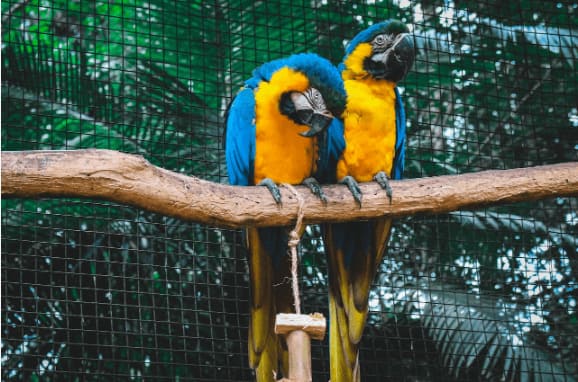
The majestic hyacinth macaw holds the title of the largest parrot species. While not everyone has the space to accommodate these gentle giants, those who do can enjoy a deep and lasting bond with these affectionate and highly social birds.
Hyacinth macaws thrive on human interaction and love being handled, always seeking affection from their owners. Their striking cobalt blue feathers, combined with bright yellow markings around their eyes and beak, give them a charming, almost smiling expression.
Though they are among the more expensive pet birds and require an exceptionally large living space, those who can meet their needs will gain a devoted lifelong companion. With proper care, these stunning parrots can live for more than 30 years.
Species Information
- Weight: 42 to 51 ounces
- Length: Around 40 inches
- Lifespan: Typically exceeds 30 years
- Physical Characteristics: Deep blue feathers, yellow markings around the eyes and beak, black beak, and dark gray feet
African Grey Parrots
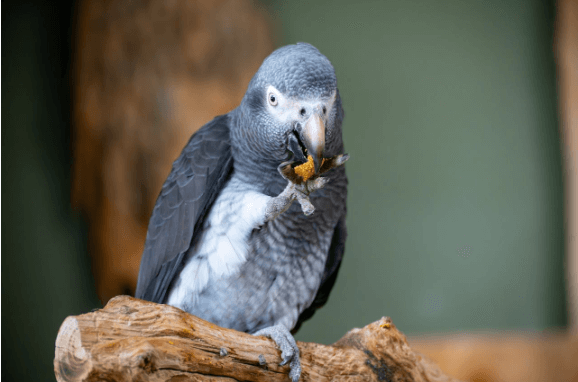
African grey parrots are not ideal for first-time bird owners, but experienced bird enthusiasts often develop a deep bond with these intelligent and demanding companions. Widely regarded as the most intelligent bird species, African greys can learn an extensive vocabulary. Many owners even observe that their parrots seem to use words in context and are highly attuned to human emotions.
Due to their remarkable intelligence, these parrots require at least five hours of mental and physical stimulation daily to prevent boredom or depression. While they respond well to training using positive reinforcement and operant conditioning, beginners may need to invest time in learning proper techniques. Because of their high-maintenance nature, African greys are best suited for dedicated owners prepared for a lifelong commitment. For those willing to put in the effort, these birds can become exceptionally loyal and affectionate companions.
Species Information
- Weight: 15 to 18 ounces
- Length: Around 13 inches
- Lifespan: Commonly exceeds 30 years
- Physical Characteristics: Various shades of gray across the body, contrasted with vibrant red tail feathers
Pionus Parrots
Pionus parrots are best known for their affectionate yet independent nature. While they enjoy socializing with their owners, they are also content entertaining themselves with toys or exercise, making them well-suited for individuals who may not always be available to interact with their pets.
Medium-sized and requiring at least three hours outside their cage daily for exercise, Pionus parrots are still relatively low-maintenance compared to other parrots of similar intelligence. Their easy going temperament makes them an excellent choice for first-time parrot owners, especially when compared to the more demanding macaws.
Thanks to their calm demeanor and relatively quiet nature, Pionus parrots are a great option for apartment dwellers seeking a feathered companion.
Species Information
- Weight: 8 to 9 ounces
- Length: Approximately 11 inches
- Lifespan: Commonly lives over 30 years
- Physical Characteristics: Blue head and neck, green body, black markings over the ears, red tail underside, and a black beak with red sides
Budgerigar
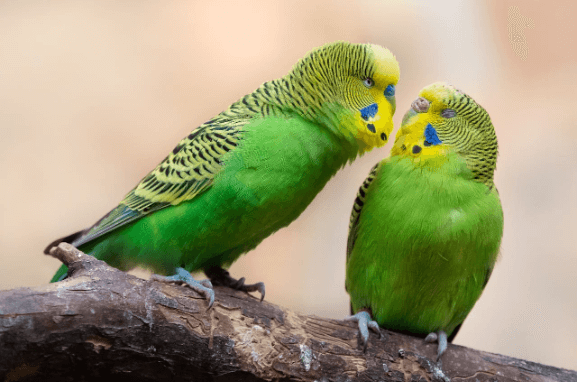
Budgies, also known as parakeets, are among the most popular pet birds worldwide—and for good reason. When properly tamed and cared for, they can be incredibly affectionate and social. These lively birds love to chirp and sing, making them a delightful addition to any home. Budgies can be kept alone or in pairs, depending on their owner’s preference.
In addition to being small and relatively low-maintenance, budgies are highly trainable and can learn various tricks, including mimicking speech. Their playful nature and adaptability make them an excellent choice for first-time bird owners.
Species Overview
- Length: 6 to 8 inches
- Weight: Around 1 ounce
- Lifespan: Up to 20 years
- Physical Characteristics: Green abdomen, black and yellow patterned back, yellow head, and dark blue tail. Color variations include blue, yellow, white, and gray.
Green-Cheeked Conures

Native to South America, green-cheeked conures are social birds that thrive on interaction with their caretakers. Playful and intelligent, these mischievous little parrots love to entertain and form strong bonds with their owners through their charming antics.
Unlike many other conure species, green-cheeked conures are relatively quiet and rarely develop the ability to mimic speech. However, their affectionate nature and fun-loving personality make them wonderful companions for those seeking a quieter pet bird. If you’re looking for a friendly, interactive bird with a calmer demeanor, a green-cheeked conure could be the perfect choice!
Species Information
- Weight: 2 to 3 ounces
- Length: 10 to 11 inches
- Lifespan: With proper care and affection, they can live up to 30 years
- Physical Characteristics: Primarily green with a gray head and chest, blue-tipped wings, and a maroon tail. Additional color variations include yellow, cinnamon, and turquoise.
Eclectus Parrots
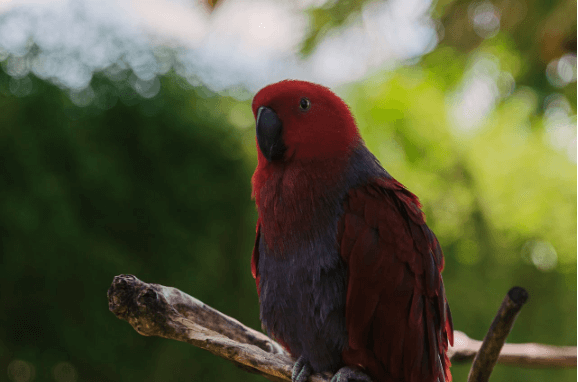
Originating from the rainforests of the Solomon Islands, the eclectus parrot is known for its striking sexual dimorphism—males are a vivid green, while females display a brilliant red and purple coloration. These large parrots are highly intelligent and social, but they thrive best in calm environments, as they can become easily stressed by excessive noise and activity.
Eclectus parrots require plenty of interaction and do well with a predictable daily routine. While they are excellent talkers and can learn an impressive vocabulary, they tend to be quieter than many other parrot species. With the right care, they make affectionate and engaging companions.
Species Overview
- Length: 17 to 20 inches
- Weight: 13 to 18 ounces
- Lifespan: Typically 30 to 50 years
- Physical Characteristics: Males are bright green with red and blue under their wings, while females have a striking red body with purple on the chest.
Canaries

Canaries are captivating, melodic birds known for their enchanting songs, particularly from the males. These friendly, small finches are native to the Canary Islands and boast over 200 different varieties. Renowned for their lively personalities and sharp intelligence, canaries are easy to train, with many even learning to perch on their owner’s hand. Their low-maintenance nature makes them ideal pets for beginners. While they aren’t fond of excessive handling, they thrive on gentle strokes and affectionate attention, making them a charming companion for bird lovers.
Tips for Caring for Your First Pet Bird
- Provide a Proper Cage – Ensure the cage is spacious, clean, and equipped with perches and toys.
- Social Interaction – Spend time with your bird daily to build trust and prevent loneliness.
- Balanced Diet – Feed your bird a diet of high-quality seeds, pellets, fruits, and vegetables.
- Flight Time – Allow your bird to fly outside the cage in a safe, enclosed space.
- Regular Health Checks – Schedule routine vet visits to monitor your bird’s health.
- Enrichment & Training – Provide toys, puzzles, and training sessions to keep your bird mentally stimulated.
Why Choose a Pet Bird?
Pet birds are intelligent, social, and engaging companions. Unlike traditional pets like dogs or cats, birds require less space, making them ideal for apartment living. They can also be trained to perform tricks, mimic speech, and bond deeply with their owners. Additionally, birds have unique personalities, ranging from playful and energetic to calm and affectionate.
Species Overview:
- Length: 5 to 8 inches
- Weight: Less than 1 ounce
- Physical Characteristics: A spectrum of vibrant colors, including yellow, orange, white, and red feathers
- Lifespan: 5 to 15 years
Final Thoughts
Choosing the right pet bird depends on your lifestyle, available space, and level of commitment. Whether you prefer a chatty companion like a budgie or a quiet observer like a canary, there’s a bird species suited to everyone. Remember, birds require daily care, socialization, and a proper environment to thrive. With love and attention, your feathered friend will bring joy and companionship for years to come!
For more detailed guides and expert pet advice, visit HomePetsAdvisor.com!







